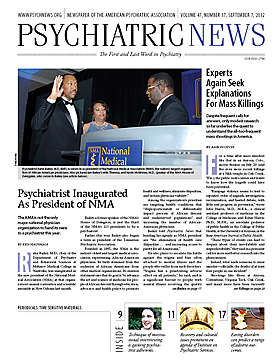The 2012 Institute on Psychiatric Services (IPS) in New York City October 4–7 will provide a broad array of compelling educational sessions. As recovery becomes a part of psychiatry’s vernacular and widely recognized as the outcome most desired by people who seek assistance for behavioral health issues, there is a growing need for psychiatrists to develop the skills needed to deliver the care that supports it.
While the IPS has offered a strong program of topics related to recovery in recent years, this year’s program is especially rich in this regard. Diversity, cultural competence, social inclusion, and the elimination of health disparities are frequently part of any consideration of recovery-oriented care, and these topics too will be prominently featured at this year’s IPS.
The scientific program includes a presentation by OMNA on Tour, a traveling mental health disparities track customized for the local community that has become a fixture of IPS. This year, OMNA on Tour will focus for the first time on trauma-informed care and confronting organizational racism in an effort to stimulate an integrated approach to system change for people with mental illness and for mental health professionals.
Presentations in the OMNA on Tour track will offer information on self-assessment tools and guidance regarding racial and cultural issues in mental health care. Other sessions will examine the historical underpinnings of racial bias surrounding behavioral health care in the child-welfare system.
Preventive service delivery for families with multiple challenges will also be discussed. The track will include two courses that will enlighten audiences about incorporating culture into assessment, diagnosis, and treatment and understanding the mental health impact of racism in everyday life, as well as a symposium, a lecture, and concurrent “breakout” workshops that are designed to follow in sequence from the earlier sessions. Attending sessions in the OMNA on Tour track will give attendees a sense of participating in a mini-conference within a conference.
Educational sessions on recovery and recovery-oriented care will range from the basics to the more-complex aspects of these concepts. A discussion group on psychiatry’s role in the Recovery to Practice project will provide an update on the progress of this effort, funded by the Substance Abuse and Mental Health Services Administration, in which APA and the American Association of Community Psychiatrists are developing an in-person and online curriculum and training for psychiatrists on how to deliver recovery-oriented psychiatric care. Audience feedback will be solicited to help refine the draft curriculum and ensure that psychiatrists at varying stages of development benefit from its contents and methods of delivery.
Some of the other topics on the program related to recovery include
•
prevention and wellness in behavioral health care
•
consumer and family participation in psychiatric education
•
integrated assessment and collaborative recovery planning
•
sustained recovery for people with severe mental illness
•
recovery-oriented practices in emergency psychiatry
•
HIPAA in the context of recovery-based care
•
recovery principles as an integrative element in training community psychiatrists.
One highlight of the program will be a discussion between Keris Myrick, a leading national mental health advocate and current president of the board of the National Alliance on Mental Illness, and her psychiatrist, Dr. Timothy Pylko, which will be held Saturday evening, October 6. They will discuss their therapeutic relationship and recovery-oriented approaches to care that have been instrumental in Myrick’s recovery. Their partnership was described in a 2011 New York Times front-page article by Ben Carey, which was a part of a series on successful professionals living with mental illness.
This program has something for everyone and will inspire psychiatrists, other mental health professionals, and people with lived experience to work more productively and flexibly together to achieve the goal of a satisfying life in the community. Don’t miss it!

Annelle Primm, M.D., M.P.H., is senior deputy medical director and head of the Office of Minority and National Affairs at APA; Wesley Sowers, M.D., is a consultant to the IPS Scientific Program Committee.

